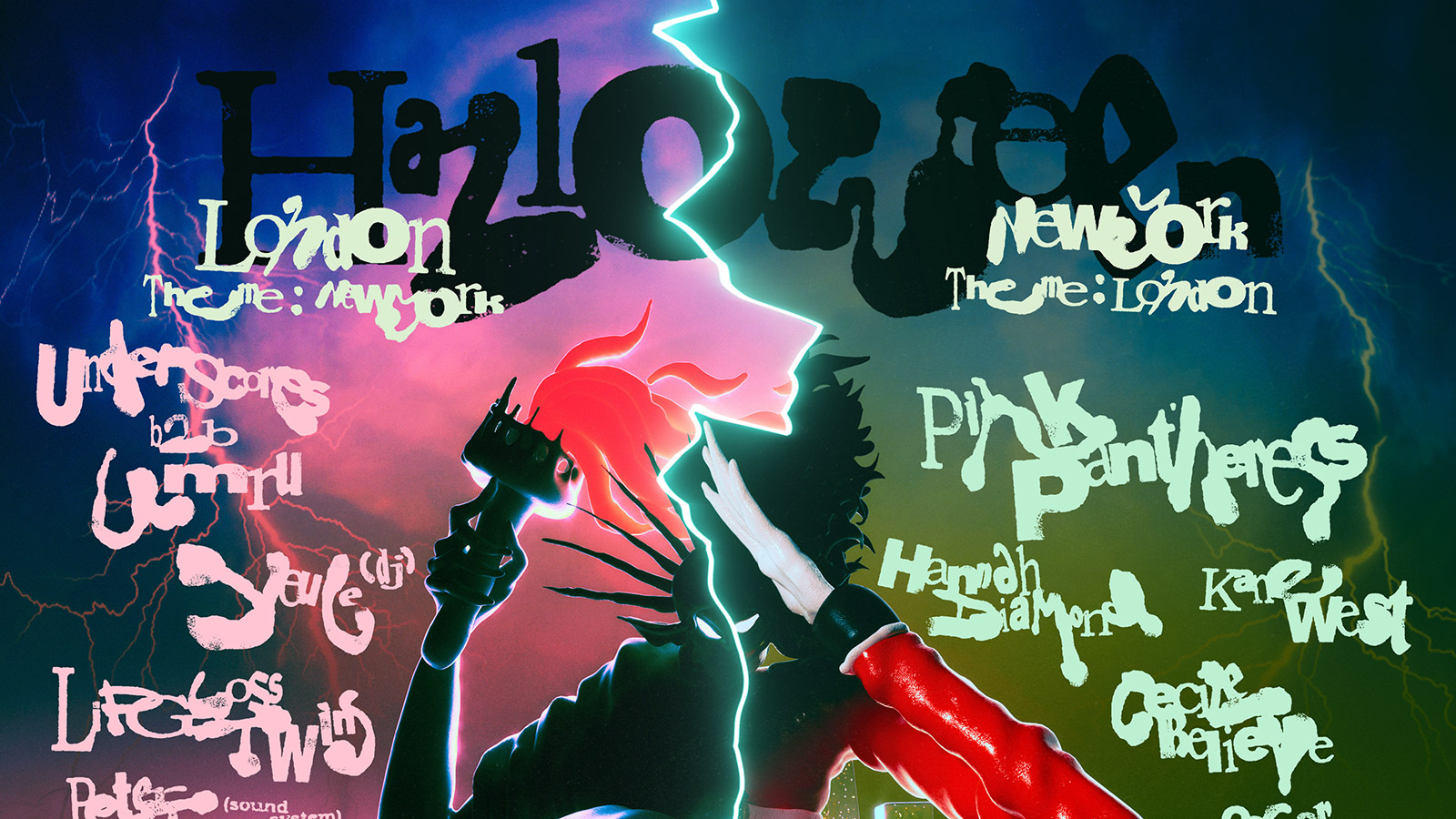The electronic outfit have been releasing jaw-droppingly dreamy tracks for the past six years, and now seems a fitting time to head out on a new adventure into another one of their vivid dreamscapes: portals//polarities.
The title on its own is somewhat provocative. Now more than ever, we live in a polarized world. Technologically speaking, it’s getting harder to know what’s real – AI is out there replicating entire bands, while actual musicians are left stranded, navigating complex landscapes of algorithmic proportion. What happens, then, when digital meets analogue?
I stepped into cyberspace to have a chat with the members of Night Tapes. Vesik’s energy is bubbly and infectious. All three of them are, really, as it’s clear that they have known each other a long time. Peering into the screen, I note that it’s this exact technology that allows the band to weave new webs of sound on the road. While their earlier collections Dream Forever In Glorious Stereo (2019), Download Spirit (2020), and Perfect Kindness (2023) hone in on the buzz of London’s cityscape from the artists’ shared abode, portals//polarities comes as a more “extroverted work.” Despite being forced to create quietly, so as not to disturb the neighbours, this new album represents a certain freedom.
Night Tapes are all about vibes. More specifically, they’re about organic feeling and expression. Each of these tracks tells the story of a time and place, serving as a diverse array of sounds and mapping the band’s sonic dreamscape – from sun-laced dance hits about a screen-obsessed world (“television”) to more seedy city grit (“leave it all behind, Mike”), the album feels like riding a virtual wave of both soft and heavy currents.
Sitting atop Doohan and Richards’ hypnotic instrumentals, Vesik’s whispered vocals act as a teleportation device. Amid twisting tones that feel weightless, tracks like “tokyo sway” and “masterplan” feel like a journey to another dimension – one entwined in VHS-tape ribbon and a blue crackling screen. The heavy-hitting punchy beats of delicate trip-hop track “babygirl (like n01 else)” juxtapose with Vesik’s syrupy vocals. From “enter” to “wayfarer”, Night Tapes invite nostalgia without going backwards in time. Instead, they’re bridging the gap, bringing together both inner and outer worlds.
“They really are like time capsules,” Doohan says, discussing how each track holds “the memories of the people [they] were with.” The same way film cameras both capture light in time, Night Tapes use whatever tools are at their disposal, including iPhones, to catch their motion in sound, occasionally even running digital recordings through analogue methods, to “have different worlds connect – the box world and the real world,” as Vesik sees it.
“I do feel like there’s a magic that happens in between the worlds,” singer Iiris Vesik explains, glowing at the possibility of having a “pathway in between the digital and the real [world].” The album art for portal//polarities even suggests a portal, depicting what could either be a tubular wave or an electric cloud storm. While Night Tapes’ music videos ride the line between cyberwave and ‘90s-Mazzy-Star-on-MTV (an ever-charming mashup), their aesthetic is less sci-fi and more spiritual, considering the many complex worlds that live within a human mind. In this way, basically anything can be a portal.
“Your body can be a portal, everything we set our focus to can be a portal,” Vesik adds. “What portals are we making in our own life? In the lives of others? In society? If we don’t believe that we have the power to make portals to nourishing and joyful realities, I think it’s not very useful.”
In general, electronic music has an air of being “perfected.” When polished and tuned, live instrumental tracking sometimes disappears. Night Tapes, however, bend these expectations by tracking with both messy and masterly methods. “When we capture the recordings – the raw recordings – that’s not precise,” Doohan clarifies. “But then we [go] through everything with a fine-toothed comb and apply that electronic production mindset to these imperfect things.” The resulting sound is something a bit in between, capturing the human behind the computerboard.
To simply call the band “electronic” does them a disservice. Their work feels more like a lucid dream, breathing new life into the familiar sounds of shoegaze, synth-pop, and trip-hop, gripping a ‘90s backdrop while looking into the future. On top of it all, they write everything improvisationally. Whether at home or abroad, the process is so wonderfully collaborative that they sometimes forget who wrote which line. Doohan laughs, “There are some bass lines that I’ll play the first half of and then Richie will play the second half, maybe slightly overlaying each other, so they’re actually kind of impossible to play!” Later, they have to relearn each track to play live as a band, pulling from recordings and fitting them together again like puzzle pieces.
Their latest single “storm” came out “like a sneeze,” Vesik laughs. “It came out really fast. Then I’m like, ‘What does it mean!’” Sure, storms – and sneezes – can bring about moments of turbulence and chaos, though they often leave behind a fresh feeling of clarity. This method of creating – act first, process later – can serve as a connective tool, accessing otherwise unrecognized ideas or emotions. Just as 19th century surrealism used visual art and language to circle the idea of the “subconscious mind,” Vesik, Doohan, and Richards dip their toes in the wells of musical knowledge, emerging a new potentiality.
“Sometimes, lyric writing can be a bit of a journey in the inner world,” Vesik reflects. “We are drawn to the first takes because there’s a sense of adventure in them. I don’t know where it’s going, and I’m hoping to uncover some secrets within myself.” In some ways, writing an album can be like holding up a mirror not only to yourself, but to society as a whole, drawing out larger meanings that tend to lay buried or unresolved.
So why a Night Tapes album now? They’ve been so successfully locked in with conceptual EPs, it’s landed them tours across the globe and over 18 million streams. While a lot of their inspiration still stems from London, the group got a fresh wave of inspiration out on the road post-pandemic lockdown. In the end, Vesik explains, “We tried writing at home for quite a long time before, and it all just came together on tour.”
Lit by a new match, Vesik, Doohan, and Richards were able to find new inspiration in the very places they dreamt of visiting. After kicking off the dust of pandemic restlessness, Richards notices that “the songs were a way of escaping the mundanity of being in London and being inside. We were lucky we could be together to write that, but a lot of the time, it’s as if we’re somewhere else.” They had hoped to visit Mexico, even writing “pacifico” about the city of San José del Pacifico before ever setting foot in the country. The track serves instead as a daydream, depicting a place their friend had visited and told them about.
“To do the album and have it written in these places we envisioned was really interesting,“ Richards says about how it felt to write in LA. Some of the tracks even capture Estonian-born Vesik’s origins in sampling Estonian swamps, alongside some sounds of the mountains of Mexico – which the band has now visited, albeit not yet San José del Pacifico.
“We love EPs,” Doohan emphasizes about their previous works. “We’ve done 4 EPs, it’s just such a nice format. But I think we all felt at some point we really needed to deep dive and make a long play where we can go through more worlds over the course of one project.” Moving from five-track EPs into a 13-track album is no small feat. Richards explains, “You can get a really nice conceptual and musical coherence [on an EP]. It’s a smaller body of work. It’s easier to do that. We wanted to do the same thing with an album.”
In the end, Night Tapes didn’t create an ordinary album. They wove a sonic story. In soundtracking their own memories, portals//polarities offers a unique auditory landscape, traversing the space between our own introverted and extroverted selves.

 1 month ago
23
1 month ago
23


















 English (US) ·
English (US) ·